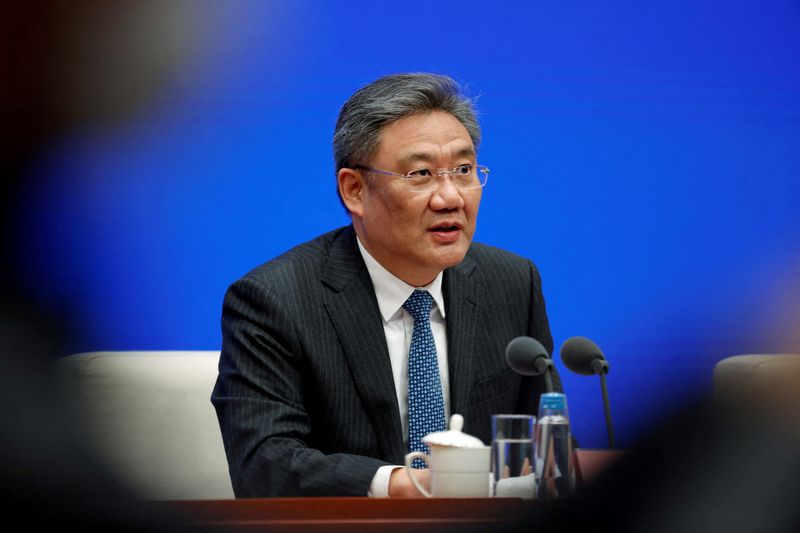By David Lawder and Liz Lee
DETROIT/BEIJING (Reuters) -U.S. Commerce Secretary Gina Raimondo and Chinese Commerce Minister Wang Wentao traded barbs on trade, investment and export policies in talks on Thursday described by Raimondo's office as "candid and substantive."
Their meeting in Washington was the first U.S.-China cabinet-level exchange in months, after a string of trade and national security irritants derailed plans for re-engagement between the world's two largest economies.
"The two had candid and substantive discussions on issues relating to the U.S.-China commercial relationship, including the overall environment in both countries for trade and investment and areas for potential cooperation," the Commerce Department said in a statement.
"Secretary Raimondo also raised concerns about the recent spate of PRC (People's Republic of China) actions taken against U.S. companies operating in the PRC," the statement added.
Wang raised key concerns about U.S. policies toward China, including on semiconductors, export controls and reviews of foreign investments, a Chinese Commerce Ministry statement said.
Both sides agreed to establish and maintain open communication channels, with Raimondo's office saying that would help "responsibly manage the relationship."
China's Commerce Ministry said the communications would allow exchanges on specific economic trade concerns and cooperation matters.
Wang is also expected to meet with U.S. Trade Representative Katherine Tai on the sidelines of an APEC trade ministers meeting in Detroit that wraps up on Friday.
U.S. President Joe Biden and Chinese President Xi Jinping pledged more frequent communications at a G20 summit in Indonesia last November to avoid U.S.-China tensions from spilling into a new Cold War.
But those plans suffered several setbacks, starting with the downing of a Chinese spy balloon in U.S. coastal waters.
These irritants continued through last Sunday, when G7 leaders pledged to resist China's "economic coercion" and Beijing responded by declaring U.S. memory chip maker Micron Technology (NASDAQ:MU) a national security risk, banning its sales to key domestic industries.
The ban followed a series of raids on American consultancies in China.
On Monday, Wang met representatives of American firms in Shanghai, including Johnson & Johnson (NYSE:JNJ), 3M, Dow, Merck, and Honeywell (NASDAQ:HON), according to the Ministry of Commerce, telling them that "China will continue to welcome U.S.-funded enterprises to develop in China and achieve win-win results".
China has complained about the growing number of U.S. export restrictions on advanced semiconductors and other high technology goods that could have military applications and security reviews that discourage Chinese investment in the United States.

Wang's trip to the U.S. comes after Group of Seven (G7) leaders met in Hiroshima, at which U.S. President Joe Biden and other G7 leaders took aim at China over "economic coercion" and said they would "de-risk" without "decoupling" from the world's second-largest economy in everything from chips to minerals.
Raimondo, Blinken, and Treasury Secretary Janet Yellen have all expressed interest in visiting China.